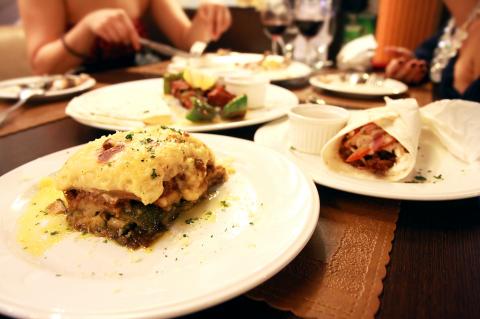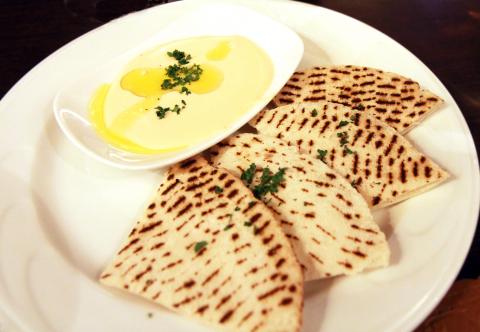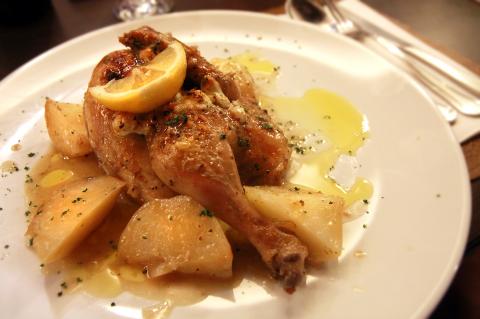Taipei lacks good Mediterranean fare, and the few places that have taken a stab at it have not lived up to the region’s many flavors. So I was skeptical when I heard news of another Greek kitchen opening up. Following my third trip in a month, however, I am convinced that Opa Greek is a bona fide culinary cruise through traditional Greece.
Opa Greek is not trying to be anything it’s not — like a white stucco hut in Santorini, Greece. Besides one mural of the picturesque town looking out over azure seas, you would never know it is a Greek restaurant just by looking at it. The homey dining room leans towards the upscale, with dark and bold furnishings that are offset by bright, maybe a little too bright, lighting.
There is something to be said about western-style service, which was consistent throughout all of my visits. An English language teacher from the US and her Philippino husband run Opa Greek. Her vision sparked interest in the parents of one of her students, and soon, they were all greeting patrons together. Their chef studied gastronomy in Greece under the supervision of an 86-year-old local woman in a 140-year-old restaurant, and those are the recipes that are offered on their bill of fare.

Photo: Olivia Wycech
The menu is extensive, so sharing is encouraged even beyond the appetizers. I suggest sharing some dips so more time can be spent with the rest of the menu. For people that have been coveting proper tzatziki (NT$130), Opa has what you are looking for. And don’t forget to try the htipiti (NT$160), a creamy blend of feta cheese and roasted red peppers that is slightly spicy. A few wedges of pita accompany all the dips. The kalamarakia (NT$220), or calamari, is breaded western style and delicately fried, served with a heap of tzatziki. I regret not ordering the spinach and artichoke fondue (NT$240), as I enviously eyed my neighbors and almost asked for a taste.
There are only three salads on the menu, and you don’t want to confuse them. The horiatiki salad (Greek village summer salad, NT$180 solo, NT$480 to share) is what made Greek salad famous, with big chunks of tomatoes, cucumbers, feta, olives and bell peppers bathed in a red wine and caper infused vinaigrette. Don’t be fooled by the Greek-style salad (NT$180 solo, NT$480 to share), which is more of a tossed salad over mixed greens, topped with a sweet Greek vinaigrette. It’s different, but still very good. Unless salad is your only dish, the solo is sized to share.
Both the greek lentil soup (NT$130) and the kakavla soup (NT$195) will remind you of that soup your mother once made that you can never just get right yourself. They are both light in flavor and density, and while smoky lentils are the main attraction of the lentil soup, the kakavla, also called the Greek fisherman’s stew, comes loaded with a variety of seafood simmered in a saffron-laced broth. Portions are small and not ideal for sharing, but definitely worth sipping.

Photo: Olivia Wycech
Remember just one word when ordering the gyros (NT$160 to NT$220) and the souvlaki (NT$250 to NT$350): lamb. Not only is mutton the meat of choice in Greek cuisine, but it’s also Opa’s specialty. The gyros are stuffed with shavings of soft and succulent lamb, red onions and tomatoes. The souvlaki, meanwhile, is much meatier. Hunks of meat are seasoned, skewered and then grilled with onions and bell peppers. Both are served with tzatziki, pita and honey mustard sauce.
There is a reason that moussaka (NT$250) is considered Greece’s national dish, and if you’ve never had it, Opa is a good place to start. Imagine a piece of lasagna minus the pasta and plus a thick — and I mean thick — layer of rich bechamel sauce that blankets a strata of beef, pork, eggplant and zucchini. The kotopolo lemonato (NT$380) came recommended and was sharp-flavored for being roasted chicken. It’s joined on the plate with feta and potatoes showered with lemon.
The desserts at Opa Greek, which I’ve tried every time I’ve gone to the restaurant, are consistently excellent. The baklava (NT$180) gets my blessing as best dessert. Phyllo pastry, walnuts and lemon honey are layered under a mound of what is perhaps the magic touch — ice cream. Even after being presented with a flaming mango (NT$250), the baklava still won out. But it was close, because triple sec drizzled over mango served on fire with ice cream is essentially a melting pot of what I imagine heaven to taste like.

Photo: Olivia Wycech

Growing up in a rural, religious community in western Canada, Kyle McCarthy loved hockey, but once he came out at 19, he quit, convinced being openly gay and an active player was untenable. So the 32-year-old says he is “very surprised” by the runaway success of Heated Rivalry, a Canadian-made series about the romance between two closeted gay players in a sport that has historically made gay men feel unwelcome. Ben Baby, the 43-year-old commissioner of the Toronto Gay Hockey Association (TGHA), calls the success of the show — which has catapulted its young lead actors to stardom -- “shocking,” and says

Inside an ordinary-looking townhouse on a narrow road in central Kaohsiung, Tsai A-li (蔡阿李) raised her three children alone for 15 years. As far as the children knew, their father was away working in the US. They were kept in the dark for as long as possible by their mother, for the truth was perhaps too sad and unjust for their young minds to bear. The family home of White Terror victim Ko Chi-hua (柯旗化) is now open to the public. Admission is free and it is just a short walk from the Kaohsiung train station. Walk two blocks south along Jhongshan

The 2018 nine-in-one local elections were a wild ride that no one saw coming. Entering that year, the Chinese Nationalist Party (KMT) was demoralized and in disarray — and fearing an existential crisis. By the end of the year, the party was riding high and swept most of the country in a landslide, including toppling the Democratic Progressive Party (DPP) in their Kaohsiung stronghold. Could something like that happen again on the DPP side in this year’s nine-in-one elections? The short answer is not exactly; the conditions were very specific. However, it does illustrate how swiftly every assumption early in an

Snoop Dogg arrived at Intuit Dome hours before tipoff, long before most fans filled the arena and even before some players. Dressed in a gray suit and black turtleneck, a diamond-encrusted Peacock pendant resting on his chest and purple Chuck Taylor sneakers with gold laces nodding to his lifelong Los Angeles Lakers allegiance, Snoop didn’t rush. He didn’t posture. He waited for his moment to shine as an NBA analyst alongside Reggie Miller and Terry Gannon for Peacock’s recent Golden State Warriors at Los Angeles Clippers broadcast during the second half. With an AP reporter trailing him through the arena for an